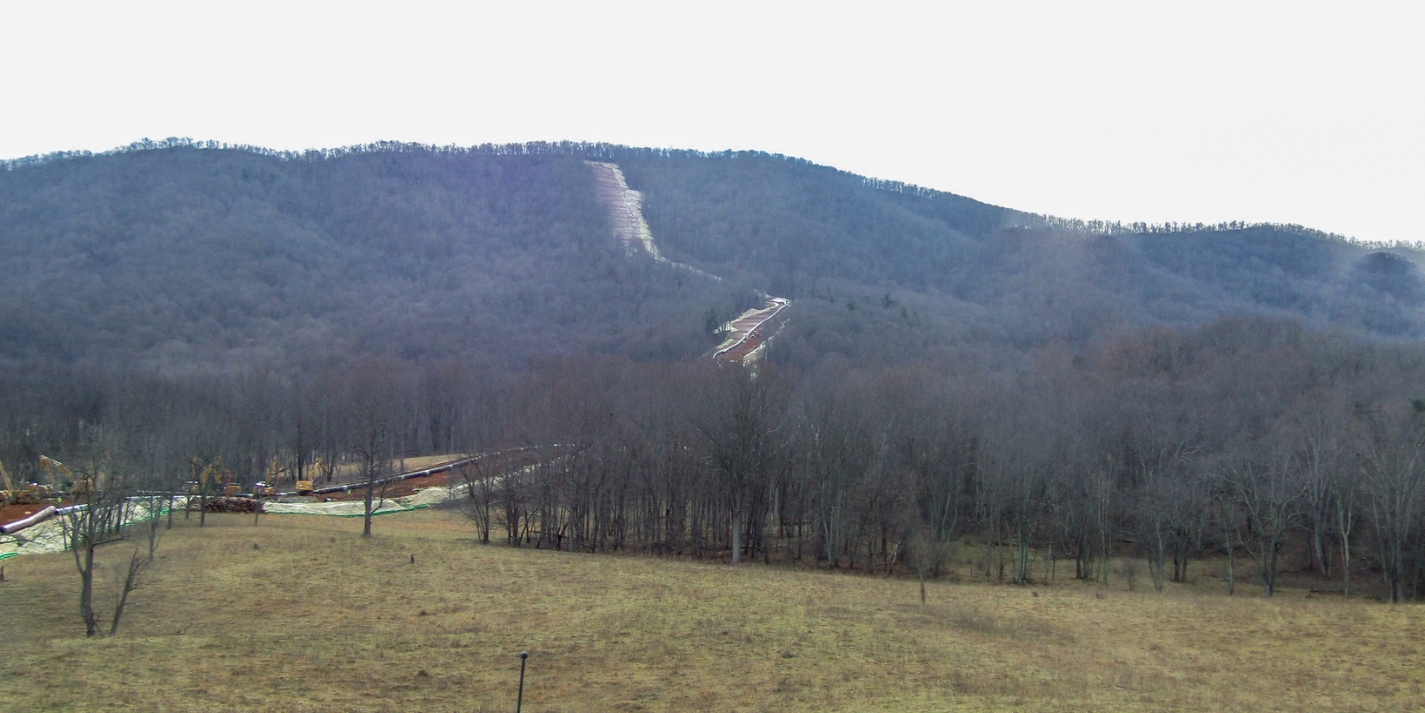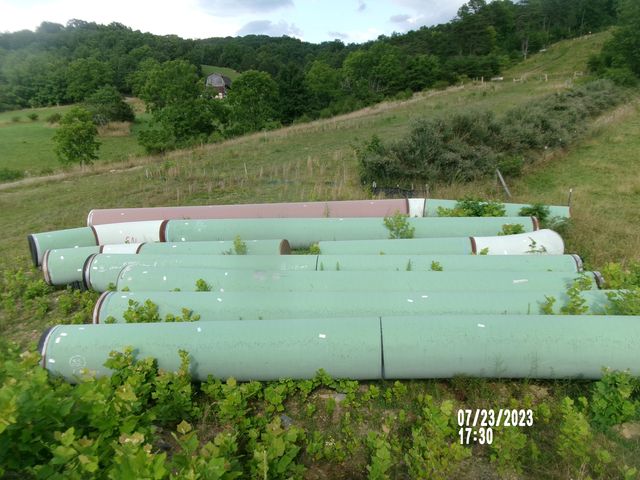By Maury Johnson
In 2014, I was notified that a large conglomerate of so-called ‘natural gas’ corporations wanted to run a 42-inch interstate pipeline across my ancestral organic farm in Monroe County, West Virginia.
This began my nearly ten-year saga of learning about the dangers of, and becoming a fierce opponent to, this insane ‘ticking time bomb’ project. The opposition to this project is a classic David versus Goliath story. Most government agencies, elected representatives, and even some organizations—like the Appalachian Trail Conservancy—have sold out to the pipeline developers.
As most readers of The Highlands Voice newsletter probably know, completion of the MVP has been delayed for over five years. It was virtually dead until West Virginia Senator Joe Manchin, working with Republicans and a few powerful Democrats who cater to the Fossil Fuel industry, inserted what is popularly known by those fighting the MVP as the “Dirty Deal Provision” into the Fiscal Responsibility Act of 2023.
This provision, officially named Section 324, was attached to the end of the ‘must pass’ Fiscal Responsibility Act to avoid a debt ceiling crisis. This provision abruptly terminated most of the lawsuits against the MVP by prohibiting and depriving citizens of their constitutional rights to petition the government before the courts. It also short-circuited the permitting and review processes that have been the foundation of our nation’s laws and policies for over 200 years.
Starting in June, just days after the passage of that provision, the developers of what I have recently renamed the ‘Mud in the Valley Pipeline’ resumed construction across West Virginia and Virginia. While some people believed that ‘this was the final stroke that would break the camel’s back,’ most of the frontline coalitions and their allies instead rallied to reinforce their opposition.
The questionable practice of using sections of degraded pipe that had been lying on the ground exposed to the elements for over five years—despite the manufacturer’s expiration warnings of the six-month limit on ultraviolet radiation and weather exposure—surfaced as a high-priority public safety issue.
This issue was first raised in 2019 by my friend William “Bill” Limpert, a former Maryland Department of Environment regulator, who was thrust into this battle when the 42-inch Atlantic Coast Pipeline was slated to cross his retirement property in Bath County, Virginia. Bill continued to research and raise awareness about the danger posed by these outdated pipe sections for the next four years, even after the Atlantic Coast Pipeline was canceled.
He was instrumental in getting the Pipeline Hazardous Materials and Safety Administration (PHMSA) to acknowledge the safety issues regarding the unprotected pipes strewn across the region. The entire environmental community was deeply affected when Bill passed away in early February this year. We will always be indebted to the tenacity of his unwavering stance for truth and for the safety of his friends and neighbors across West Virginia and Virginia.
To date, PHMSA has not undertaken the steps to adequately ensure the safety of the people, towns, schools, and churches located in the blast zone of the MVP, but Bill Limpert’s legacy of leaving no stone unturned lives on.
Some of the towns and neighborhoods where the safety of large numbers of people is at risk are: The Panther Creek Elementary School and adjacent community Health Center in Nicholas County, West Virginia; the towns of Rainelle, Pence Springs, Craigsville, and Lindside in West Virginia; and those of Newport, Elliston, Bent Mountain, and Mount Tabor (a suburb of Blacksburg) in Virginia.
This is only a mention of a few areas located in the blast zone of the MVP. The number of churches, sacred sites, family homes and farms are too numerous to list. Once we investigate and become aware of the health risks and consequences of an explosion associated with this project, we live in fear of its life-threatening potential. But on the upside, this fear is the motivator for action.
The environmental and climate change repercussions are equally as significant. I have been a volunteer pipeline monitor for the West Virginia Rivers Coalition, the Indian Creek Watershed Association, and the Mountain Valley Watch program since 2015. This work has taken me several times from where the pipeline starts in Mobley, West Virginia, to its terminus in Chatham, Virginia. The sections closest to my home in Monroe County, along with those spanning from Fayette County to Giles County, Virginia, have been my most frequently visited areas.
In the month of February alone, I have traveled over 1,000 miles to conduct my monitoring. I’ve written over 230 Complaints to the West Virginia Department of Environmental Protection (DEP) and a few to the Virginia Department of Environmental Quality (DEQ) over the past six years based on documented environmental and safety violations, such as erosion, slippage, silt fence collapse, illegal refueling of equipment within 100 feet of a water body, mudslides and mud tracked on to public roads, etc.
Since construction resumed in June of this past year, I have sent nearly 100 Complaints and Concerns to the West Virginia DEP covering every county in the state and a few to Virginia’s DEQ.
I have attended several meetings with the PHMSA and the Pipeline Safety Trust. These meetings have taken place in Washington DC, Arlington, Virginia, New Orleans, Los Angeles, and on my farm in Monroe County.
In December, along with Mariah Clay, West Virginia Rivers Coalition MVP Coordinator, I helped facilitate a meeting with PHMSA Officials on a site visit across four counties in southern West Virginia. Even though I have met some caring officials, it is apparent that PHMSA is not protecting West Virginia and Virginia from the almost certain disaster that many of us living and working near this pipeline fear.
The MVP has been called the most dangerous pipeline in America by a number of groups and individuals, including some pipeline safety experts. Indeed, at the Annual Pipeline Safety Trust Conference I attended this past fall, one of the panel discussions was entitled, ‘Developments in Geo-Hazards: How are Regulators, Experts, and the Industry Addressing this Concern?’
Richard Kuprewicz, President of Accufacts, Inc., who is one of the nation’s foremost authorities on Pipeline Safety, spoke about the existence of geo-hazard threats to pipelines. He specifically referenced the MVP in this comment, “I think you heard some people this morning talk about the MVP. OK. You ought to be nervous. Congress cannot repeal the law of gravity. They may believe they think they can, but I don’t believe they do. But again, more prudent operators will be ahead of that curve and try to avoid those threat factors from coming together because nobody wants a pipeline to rupture, especially a 42-inch gas pipeline that you are going to see from space.”
For more information about the Pipeline Safety Trust and to watch the videos from the panel discussions and presentations, please visit pstrust.org.
Although credit must be given to the West Virginia DEP for writing a few Notices of Violation to MVP recently, it must also be said that they are too few and far between.
MVP might pay a small fine, but those fines most likely will not be significant enough to stop them or other companies from just doing whatever they want. My overall assessment is that neither state environmental protection agencies are doing much to protect our fragile mountain streams and other water resources from being degraded and even destroyed along the path of the pipeline.
It appears that the Virginia DEQ is doing far less, if anything at all, to protect their high-quality streams, such as Bottom Creek, Sinking Creek, and Big Stoney Creek, to name just three of the hundreds of streams being severely impacted by the construction of the MVP across Virginia. More about these impacts can be read on the Protect Our Water, Heritage, Rights website powhr.org
Another notable lawsuit involving the MVP was filed to overturn the use of the eminent domain for private gain in the case filed in early 2020, Cletus Bohon et al. v. FERC et al. No. 20-5203. The landowners are Cletus and Beverly Bohon of Montgomery County, Virginia, Wendell and Mary Flora of Franklin County, Virginia, and Aimee and& Matt Hamm of Bent Mountain, Virginia.
For more information on this case, you can visit yugocollins.com. You can also learn how to support this lawsuit by contacting facebook.com/preservemonroe.
Finally, in late February, the group 7 Directions of Service filed a Human Rights Complaint to the United Nations Human Rights Council. The press release can be found here https://bit.ly/3uR1MvZ
As you can see, the resistance to the MVP is still strong and is gathering momentum as time goes on. Meanwhile, the MVP has recently filed a report with the United States Securities and Exchange Commission and Federal Energy Regulatory Commission admitting they misled them and the American people when they stated in April of 2023 that the pipeline would be in service in late 2023.
More recently, they stated the pipeline would not be completed until late in 2024. When it was first announced, the developers said the pipeline would cost around $3.7 billion and be completed by the end of 2018. With this most recent press release, they have extended their possible completion date again and raised the cost to a staggering $7.3 billion.
Just like in the Star Wars Trilogy, the Dark Side’s (MVP) victory is far from guaranteed, and the resistance continues as more and more people wake up to Truth. To join the resistance contact POWHR at powhr.org/get-involved/ or Mariah Clay at mclay@wvrivers.org
Maury Johnson is a West Virginia Landowner, on the Board of Directors of Preserve Monroe, and one of five recipients of the Community Sentinel Award for 2023, awarded to him for his service to his community, region, and the nation.
Editor’s note: WVHC has reached out to The Appalachian Trail Conservancy to extend an opportunity to comment on the Stewardship Trail Agreement with Mountain Valley Pipeline, LLC.


